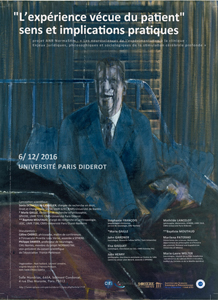
University Paris Diderot, Room Mondrian 646A*
9:00 – 18:00
International Study Day in the framework of the ANR project Normastim
SPHERE (UMR 7219, CNRS/University Paris Diderot-Paris Pantheon-Sorbonne, USPC)
PRESENTATION
This international workshop is part of the ANR Resarch Project Normastim dedicated to legal, philosophical and sociological issues in neurosciences, studied through a specific technology : Deep Brain Stimulation (ANR 14 CE30-0016-01).
This workshop aims at proposing an interdisciplinary reflection on the meaning and implications of patients’ lived experience. Philosophical, sociological, anthropological approaches will contribute to this reflection. The point of view of medical teams will also participate in it.
In relationship with the strong increase of chronic disease, the idea that patients’ lived experience should be taken into account has widely spread. It has been framed both in a theoretical and normative perspective.This notion of ’chronic disease’ has a blurred meaning. However, its various types are all characterized in the same way : long-term pathologies ; pathologies one has to live with ; pathologies that most often imply a medicalized life and a change in the way of life
Many testimonies have highlighted the consequences of these pathologies on people’s daily life. The gave strength to the idea of patients’ lived experience, which is utterly different from the conception of an active participation of the patient to the therapeutic strategy.
Such an idea has become a landmark to think of the ’good forms’ of cure and care. It has noticeably been used to underline that the patient remains ’a person’ beyond her sickness, and to stress the change it induces in one’s daily life, one’s project for the future.
Taking as a starting point this discourse on patient’s lived experience, this workshop first intends to explore its meaning for persons cured with deep brain stimulation. Does this perspective have any specificity in the context of pathologies that are taken care of thanks to this technology ?
In addition, this workshop also intends to focus on another question which is related but different from that of patients’ lived experience as it has been formulated so far. This question is the following : when a patient is taken care of, may she consider a come back to (a more or less) ordinary life ? Are medical teams ’interested’ in any way to this goal ? If so, why ? And finally, how could they help their patients in this perspective ? The workshop will tackle this issue in an comparative way, examining various therapeutic contexts.
Scientific Conception
Marie Gaille (research director in Philosophy, SPHERE, CNRS-Université Paris Diderot), Sonia Desmoulin-Canselier (researcher in law, Droit et Changement Social, UMR 6297, CNRS-Université de Nantes) & Baptiste Moutaud (researcher in anthropology, LESC, UMR 7186, CNRS-Université Paris Lumières)
PROGRAM
9:00 – 9:30 Welcome
Morning : 9:30 – 13:00
Chair : Céline CHERICI (philosopher, lecturer at Université Picardie Jules Verne, associated with SPHERE) & Philippe DAMIER (professor of neurology, CHU Nantes, member of NORMASTIM Project, vice-president of the scientific council of the Association France Parkinson)
- Introduction
- Marie GAILLE
Ce que soigner une maladie chronique veut dire : quelle alliance entre médecine et « humanités » ?
- Elsa GISQUET (sociologist, researcher at CSO, CNRS-Sciences Po)
Cerebral implants and Parkinson’s disease : A unique form
of biographical disruption ?
- Marilena PATERAKI (science historian, PhD student, Department of Philosophy and History of Science, National and Kapodistrian University of Athens)
Experiencing DBS in Greece : Parkinson’s Disease temporality and patients’ contradictory voices
- Mathilde LANCELOT (philosopher, PhD student, SPHERE, UMR 7219, CNRS-Université Paris Diderot)
Peut-on parler de « soin » en neurologie ? Application au sujet parkinsonien.
- Baptiste MOUTAUD
SCP et expérience vécu du malade : que peut-on retirer de la comparaison entre neurologie et psychiatrie ?
Afternoon : 14:00 – 17:30
Chair : Céline CHERICI & Philippe DAMIER
- John GARDNER (sociologist, Research Fellow SATSU, York University)
Deep brain stimulation in children : the institutionalization of biopsychosocial explanatory models of disease ?
- Stéphanie FRANÇOIS (clinical psychologist, Neurology Department, CHU Nantes)
La perception de soi dans le miroir de la neurostimulation en neurologie.
- Marie-Laure WELTER (neurologist, Hôpital de La Pitié-Salpêtrière, coordinator of LabCom Brain e-novation, Institut du Cerveau et de la Moëlle épinière))
Eviter la désadaptation sociale chez les patients parkinsoniens après stimulation cérébrale profonde : une étude pilote de programme psychoéducatif
- Julie HENRY (philosopher, assistant-researcher at Centre de lutte contre le cancer Léon Bérard, associated with SPHERE)
Voir la personne derrière la pathologie : d’une norme à sa mise en pratique.
- General discussion and conclusion
Organisation : Nad Fachard, Laurent Lemoine, Patricia Philippe, Virginie Maouchi, (CNRS, SPHERE) with the help of Alice Quercy
Venue
University Paris Diderot, Building Condorcet, 10, rue Alice Domon et Léonie Duquet, 75013 Paris –
Access map.
Metro line 14 / Station : Bibliothèque François Mitterrand
Metro line 6 / Station : Quai de la Gare
RER C / Station : Bibliothèque François Mitterrand
Bus 64 / Stop : Tolbiac-Bibliothèque François Mitterrand
Bus 62 & 89 / Stop : Bibliothèque Rue Mann
Bus 325 / Stop : Watt.




